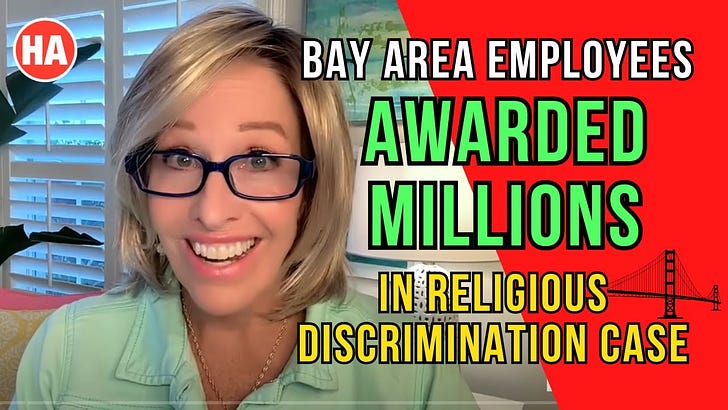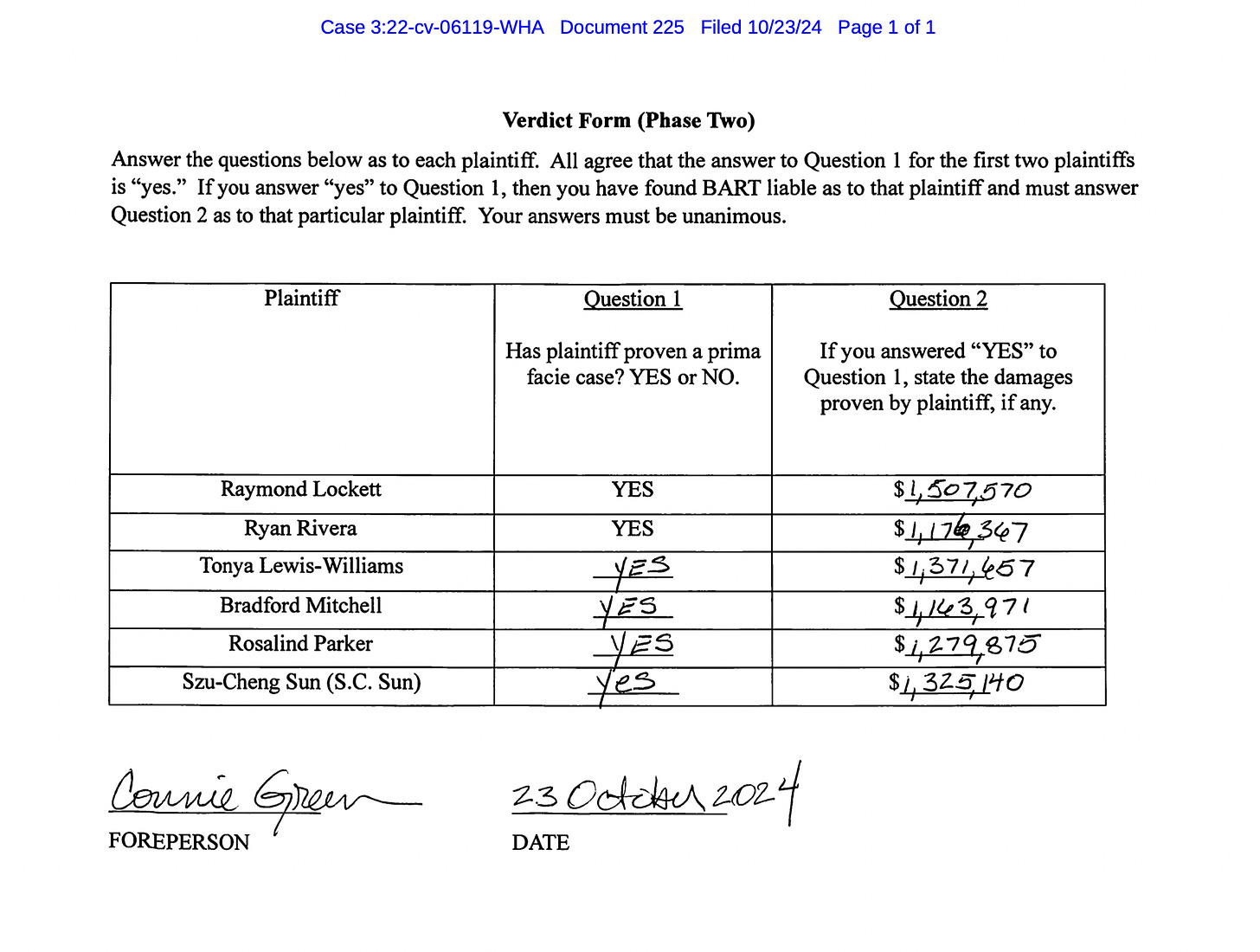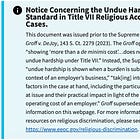TRANSIT WORKERS AWARDED MILLIONS in RELIGIOUS DISCRIMINATION TRIAL
A "fully vaccinated" jury in the world's wokest city of San Francisco agreed that the BART workers were fired ILLEGALLY because of their religious beliefs
Friends, it’s time to celebrate a massive win! The Bay Area Rapid Transit (BART), a public transportation system familiar to anyone who’s lived in or visited San Francisco, has just been hit with a multi-million dollar judgment. This decision comes on behalf of employees who stood their ground against religious discrimination. San Francisco may be the most “shutdown” city in California, but even there, freedom found a voice through these brave individuals.
The trend of outrageous discrimination is unfolding right here in the Bay Area, arguably one of California's most "pin-cushioned" regions. This case made it all the way to trial, presided over by what’s likely a fully vaccinated jury. These jurors had the important job of deciding whether the employees experienced real religious discrimination. And guess what? The verdict is in!
On October 23, a federal jury in the U.S. District Court for the Northern District of California sided with six former San Francisco Bay Area Rapid Transit (BART) employees, who were terminated for refusing to comply with a vaccination policy that clashed with their religious beliefs. Each worker is set to receive between $1.2 million and $1.5 million—a sum that sends a powerful message about the importance of respecting individual faith.
The jury — each member of which was vaccinated for Covid (according to the attorneys) — deliberated for six hours over two days before reaching their unanimous verdict, which confirmed that BART had discriminated against the plaintiffs based on their religion. Jurors were instructed to compensate the fired workers for lost wages and benefits, as well as for any "pain, suffering, or mental anguish" the plaintiffs endured due to BART's unlawful discrimination.
If you’ve been a student of The Healthy American for a while, you know it’s straightforward to invoke your religious exemption. You're not asking for permission; you’re simply letting your employer know that you’re exempt from any practices, tasks, protocols, or policies that interfere with your religious beliefs.
Your religious beliefs (including moral and ethical beliefs) are protected under federal law, specifically Title VII of the U.S. Civil Rights Act, which prohibits discrimination in the workplace based on religion and other protected classes.
You’re allowed to hold beliefs that may conflict with an employer’s policies, whether they’re rooted in religious, ethical, or moral convictions. You don’t even have to be “religious” per se; even atheists are protected under these civil rights laws.
Represented by the Pacific Justice Institute, these six workers fought for their right to religious accommodations from BART’s vaccination policy amid a growing climate of intolerance. The jury’s decision, following two days of deliberation, confirmed that BART failed to demonstrate ANY undue hardship in granting these accommodations. This ruling was not just about dollars; it was a reaffirmation that religious rights should never be dismissed lightly.
U.S. District Judge William Alsup initially declined to certify the case as a class action, instead requiring each worker to demonstrate how BART violated their religious rights. Following this, 35 plaintiffs in three consolidated cases proceeded with their individual claims. Just weeks before the July trial, 18 plaintiffs settled their claims against BART.
Several of these plaintiffs had been students of The Healthy American, seeking our professional expertise in defending their rights. We have helped tens of thousands of people learn about these laws that protect their rights!
Unfortunately, some individuals work for entities that prioritize agendas over the law, and these Healthy Americans found themselves compelled to hold BART accountable through litigation.
The case traces back to October 2021, when the BART board of directors enacted an unlawful policy requiring all employees to be vaccinated against Covid-19 cooties as a condition of continued employment. Employees were required to be fully vaccinated by December 13, 2021.
BART received a total of 205 exemption requests: 17 sought medical exemptions, while the remainder were religious. Out of those, ten medical applicants completed the process, and only eight were granted accommodations, which consisted of unpaid leave pending vaccination. No one received an accommodation that allowed them to return to work without vaccination. The workers filed a lawsuit in 2022, alleging violations of Title VII, the First Amendment, and the Fair Employment and Housing Act, seeking compensation for lost wages and non-economic damages.
Yep, after these BART employees lawfully notified their employer of their exemption, they didn’t even get to the stage of discussing accommodations.
What is an accommodation? An accommodation is a modification or adjustment to the job and it’s a process that involves negotiation and compromise between the employer and employee, ensuring the latter can keep their job without altering or abandoning their beliefs.
Think of a pharmacy worker with an objection to selling certain medications like birth control. The employer is legally obligated to find another employee to handle that transaction. It doesn’t matter if others think the belief is ridiculous; it’s not the employer’s place to judge. Legally, beliefs do not have to be logical, consistent, or even understandable to others. You could have an employee who values their body as a temple yet smokes. The law doesn’t require you to be perfect in your convictions—just that they’re sincerely held.
The law mandates that employers must explore all possible options. Employees could shift their work hours, self-screen for symptoms, or even take on different roles.
Say we have a train conductor who is deemed too risky to work—fine! Let the employer prove that claim by showing evidence. How many people did that conductor allegedly infect? What proof is there that they were the source? It’s a slippery slope, and it just doesn’t hold water.
You see, there were legal principles that were established back during the AIDS crisis. To hold someone liable for transmitting an infectious disease, it must be proven that they knowingly carried it and actively intended to infect others. So, let’s get real—do you think that BART conductor is going to remove their mask and start sneezing on passengers? Hardly.
Side note: Some lawyers are arguing, “This isn’t a vaccine; it doesn’t work like one, so it can’t be required.” While I appreciate the fight, there’s a MAJOR pitfall here. If, down the line, a legitimate vaccine comes along, the argument crumbles. The core issue isn’t whether it works; it’s about the right to refuse participation in anything that conflicts with your religious beliefs.
And let’s not ignore the employer’s flimsy arguments. They might argue, “It’s too much of a hardship to keep these unvaccinated employees.”
But let’s think about that for a second.
Firing hundreds of trained, capable, and experienced employees isn’t a hardship? Replacing them means the company has to spend money on recruitment, face time with empty positions, and the hassle of onboarding newbies. Keeping trained employees is the smart move here!
Employers can’t simply say, “We can’t accommodate you.” They have to provide compelling reasons and back that up with EVIDENCE.
But of course BART’s HR department decided they also didn’t believe the employees’ religious sincerity.
Question for you: Who on HR staff is qualified to judge your soul?
That’s right—no one.
And yet, these employees were denied their religious accommodations because the employer questioned their sincerity. Under federal law, employers cannot ask intrusive questions to “verify” an employee’s beliefs. Could you imagine if someone in HR asked you to prove your faith?
Even BART’s legal defense attempted to undermine the religious basis for these firings in court, claiming that some objections were rooted in secular, rather than religious, concerns. However, the jury firmly REJECTED this narrative, affirming the legitimacy of the workers' religious beliefs in the face of institutional pressure.
Imagine the turmoil they faced—some may have lost their homes or endured personal upheaval. It’s a powerful statement that these individuals were willing to sacrifice their jobs for their beliefs. The jury recognized the sincerity behind their convictions, a testament to their integrity.
Kevin Snider, chief counsel at the Pacific Justice Institute and lead attorney for the plaintiffs, emphasized the significance of this verdict stating a very logical point I have been saying for years: “These employees chose to lose their livelihood rather than deny their faith. That in itself shows the sincerity and depth of their convictions.”
Reminder: Your beliefs are between you and God (or whatever higher power you believe in). No HR person has the authority to assess the depths of someone’s convictions. But BART didn’t back down, pushing their employees to the point of legal action. Some employees settled out of court. Those details are under lock and key due to nondisclosure agreements, so we won’t know the exact amounts awarded. Settlements, however, don’t establish precedents, which is why others pushed forward for a jury trial.
After a hung jury, six plaintiffs persevered and took the case to the finish line. And the outcome? Every one of these plaintiffs was awarded over a million dollars!
During the trial's first phase, jurors unanimously ruled in favor of all six plaintiffs, determining that BART had not proven that each plaintiff "could not be reasonably accommodated" and allowed to continue working without undue hardship—specifically, without “jeopardizing worker and passenger safety.”
BART’s attorney, James Hanlon of Glynn Finley Mortl Hanlon & Friedenberg LLP, weakly argued, “Vaccination was purportedly BART’s most effective tool to protect its workers and riders. There were simply no acceptable alternatives for employees who refused to vaccinate.”
Oh, please! James might want to check his facts before declaring vaccination as BART’s only magic bullet for safety. It’s like saying the only way to drive safely is to drive during daylight hours. So, while BART (and all these other employers) might think they’ve got a solid case, they never had a legal leg to stand on.
After the verdict was read, Judge Alsup informed the jury that they would proceed to the second phase of the trial. "We now go to the initial threshold question of whether each plaintiff has established a sincerely held religious belief," the judge said, noting that jurors would also rule on damages for any plaintiff who could show they did not get vaccinated due to their beliefs.
BART’s attorneys have filed for a motion for "judgment as a matter of law," requesting a determination on the case which will be argued in December. According to reports, Judge Alsup offered little hope for that request, remarking, "I'm just going to say don’t hold your breath on that. The jury has spoken."
So, to summarize: you have a legal right to refuse participation in ANY employer requirement that conflicts with your religious beliefs, and employers MUST reasonably accommodate you unless they can prove (requires evidence!) otherwise.
For those who are navigating this landscape, I recommend checking out all my free educational videos here: RELIGIOUS EXEMPTION Playlist
You can also visit my website (thehealthyamerican..org/religious-exemptions), where you can find more resources on religious exemptions and get our expert help, whether you’re an employee, student, or dealing with immigration issues.
Don’t back down! You have rights, and if you’re faced with discrimination based on your beliefs, there’s hope.
P.S. For those who were bullied, coerced, intimidated, gaslit, put on leave without pay, pressured to resign and/or terminated due to the ignorant, incompetent and intentionally deceptive actions of your employer, you need to file with the EEOC to lodge your complaint immediately. The time clock for filing a lawsuit depends on many factors, including local, state and federal laws. Contact eeoc.gov or your state’s civil rights department or the department of fair employment. (There are different names in different states.)
Read Next:















I am so happy for these courageous individuals. This is your work, your teachings, your positive influence and support of the truth and the law that has brought this to fruition in the most locked down city in the country.
While it is a giant step forward with this verdict, its importance would be far greater if the case had been argued and won on the basis that no employer has the right to fire a worker because the worker refuses to be injected regardless of their reason for refusal. It is far too limiting to restrict refusal to religious exemptions.